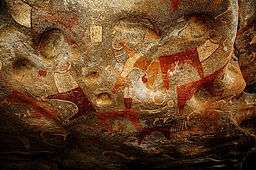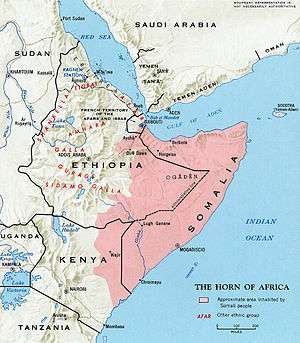Languages of Somalia
| Languages of Somalia | |
|---|---|
|
Map of Somali language distribution. | |
| Official languages | Somali, Arabic |
| Main immigrant languages | Oromo, Mushunguli |
| Main foreign languages | English, Italian |
| Sign languages | Somali Sign Language |
| Common keyboard layouts |
|
The official languages of Somalia are Somali and Arabic. A number of minority and immigrant languages are also spoken.
Somali
 |
| Part of a series on the |
| Culture of Somalia |
|---|
| Culture |
| People |
| Religion |
| Language |
| Politics |
|
Somali is the official language of Somalia and the mother tongue of the Somali people, the nation's most populous ethnic group.[1][2] It is a member of the Cushitic branch of the Afro-Asiatic family, and its nearest relatives are the Afar and Saho languages.[3] Somali is the best documented of the Cushitic languages,[4] with academic studies of it dating from before 1900.
As of 2006, there were approximately 16.6 million speakers of Somali, of which about 8.3 million reside in Somalia.[5]
The Somali language is spoken by ethnic Somalis in Greater Somalia and the Somali diaspora. It is spoken as an adoptive language by a few ethnic minority groups in these regions.
Somali dialects are divided into three main groups: Northern, Benaadir and Maay (sometimes spelled Mai or Mai Mai). Northern Somali (or Northern-Central Somali) forms the basis for Standard Somali. Benaadir (also known as Coastal Somali) is spoken on the Benadir coast from Cadaley to south of Merca, including Mogadishu, as well as in the immediate hinterland. The coastal dialects have additional phonemes which do not exist in Standard Somali. Maay is principally spoken by the Digil and Mirifle (Rahanweyn) clans in the southern areas of Somalia.[6]
The Somali language is regulated by the Regional Somali Language Academy, an intergovernmental institution established in June 2013 by the governments of Djibouti, Somalia and Ethiopia. It is officially mandated with preserving the Somali language.[7]
Arabic
In addition to Somali, Arabic, which is also an Afro-Asiatic tongue, is an official national language in Somalia.[1] Many Somalis speak it due to centuries-old cultural and ethnic ties with the Arab world, the far-reaching influence of the Arabic media, and religious education. Variants of the Yemeni and Hadhrami dialects are most common, particularly among merchants.[8]
Somali's main lexical borrowings come from Arabic. Soravia (1994) noted a total of 1,436 Arabic loanwords in Agostini a.o. 1985, a prominent Somali dictionary. Most of the vocabulary terms consisted of commonly used nouns. These lexical borrowings may have been more extensive in the past since a few words that Zaborski (1967:122) observed in the older literature were absent in Agostini's later work.[9]
Foreign & minority languages
English is widely taught in schools. It used to be a working language in the British Somaliland protectorate. Italian was an official language in Italian Somaliland and during the trusteeship period, but its use significantly diminished following independence. It is now most frequently heard among older generations.[10]
Other minority languages include the Bravanese dialect (also known as Chimwiini or Chimbalazi), a variant of the Bantu Swahili language that is spoken along the southern coast by the Bravanese people. Kibajuni is another Swahili dialect that is the mother tongue of the Bajuni ethnic minority group. Additionally, a number of Bantus speak Mushunguli as a mother tongue.[11]
Somali Sign Language
The Somali Sign Language (SSL) is a sign language used by the deaf community in Somalia and Djibouti. It was originally developed by a Somali man educated in a Somali deaf school in Wajir, Kenya. In 1997, he established the first school for the deaf in the city of Borama, situated in northwestern Somalia.
Orthography

A number of writing systems have been used for transcribing the Somali language. Of these, the Somali Latin alphabet is the most widely used, and has been the official writing script in Somalia since 1972.[12] The script was developed by the Somali linguist Shire Jama Ahmed specifically for the Somali language, and uses all letters of the English Latin alphabet except p, v and z. There are no diacritics or other special characters except the use of the apostrophe for the glottal stop, which does not occur word-initially. There are three consonant digraphs: DH, KH and SH. Tone is not marked, and front and back vowels are not distinguished.
Besides Ahmed's Latin script, other orthographies that have been used for centuries for writing Somali include the long-established Arabic script and Wadaad's writing.[13] Indigenous writing systems developed in the twentieth century include the Osmanya, Borama and Kaddare scripts, which were invented by Osman Yusuf Kenadid, Sheikh Abdurahman Sheikh Nuur and Hussein Sheikh Ahmed Kaddare, respectively.[14]
Notes
- 1 2 "The Federal Republic of Somalia - Provisional Constitution" (PDF). Retrieved 10 September 2012.
The official language of the Federal Republic of Somalia is Somali (Maay and Maxaa-tiri), and Arabic is the second language.
- ↑ "Somalia". World Factbook. Central Intelligence Agency. 2009-05-14. Retrieved 2009-05-31.
- ↑ I. M. Lewis, Peoples of the Horn of Africa: Somali, Afar and Saho, (Red Sea Press: 1998), p.11.
- ↑ "A software tool for research in linguistics and lexicography: Application to Somali". Springerlink.com. doi:10.1007/BF01540131. Retrieved 2010-06-27.
- ↑ "Somali". SIL International. 2013. Retrieved May 4, 2013.
- ↑ Andrew Dalby, Dictionary of languages: the definitive reference to more than 400 languages, (Columbia University Press: 1998), p.571.
- ↑ "Regional Somali Language Academy Launched in Djibouti". COMESA Regional Investment Agency. Retrieved 27 February 2015.
- ↑ Dalby, Andrew (1999). Dictionary of Languages: The Definitive Reference to More Than 400 Languages. Bloomsbury Pub Ltd. p. 25. ISBN 0231115687.
- ↑ Versteegh (2008:273)
- ↑ Dubnov, Helena (2003). A grammatical sketch of Somali. Köppe. pp. 70–71. ISBN 389645045X.
- ↑ Ethnologue – Mushungulu
- ↑ Economist Intelligence Unit (Great Britain), Middle East annual review, (1975), p.229
- ↑ Omniglot - Somali writing scripts
- ↑ Laitin (1977:86–87)
References
- Diriye Abdullahi, Mohamed. 2000. Le Somali, dialectes et histoire. Ph.D. dissertation, Université de Montréal.
- Saeed, John Ibrahim. 1987. Somali Reference Grammar. Springfield, VA: Dunwoody Press.
- Saeed, John Ibrahim. 1999. Somali. Amsterdam: John Benjamins.
